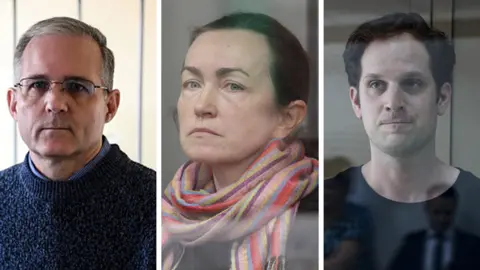One year has passed since American journalist Evan Gershkovich was detained during a reporting assignment in Russia. His potential avenue for release lies with Vadim Krasikov, currently imprisoned in Germany for a Kremlin-ordered assassination.
In the summer of 2013, a Moscow restaurant owner fell victim to a fatal shooting in the city. The perpetrator, wearing a hood, swiftly fled the scene after firing two shots.
Six years later, a strikingly similar incident occurred when exiled Chechen commander Zelimkhan Khangoshvili was murdered in a busy Berlin park, shot by a cyclist wielding a silenced Glock 26 in broad daylight.
The assailant, apprehended after disposing of a pistol and wig in the River Spree near the Reichstag, was initially identified as “Vadim Sokolov.” However, it was later revealed that the arrested individual was Vadim Krasikov, a Russian national with ties to the FSB, Russia’s security service, and the primary suspect in the 2013 Moscow murder.
In a recent interview with US TV host Tucker Carlson, Russian President Vladimir Putin seemed to confirm reports of his country’s pursuit of Krasikov’s release, describing him as a “patriot,” potentially in exchange for the detained American journalist Evan Gershkovich.
This development comes amidst Gershkovich’s year-long detention in Russia on espionage charges vehemently denied by him, his employer – the Wall Street Journal, and the US government.
However, Gershkovich isn’t the sole American detained in Russia whose fate could intersect with Krasikov’s. Former US Marine Paul Whelan and US-Russian citizen Alsu Kurmasheva are also held in Russia on charges widely perceived as politically motivated.
Even the late Russian opposition figure Alexei Navalny, serving a 19-year prison term in Russia, was reportedly part of a potential swap involving Krasikov before his death, according to his allies. Following the Russian election, Putin claimed to have agreed to Navalny’s release in exchange for individuals held in the West, although the White House denied knowledge of such an agreement.
If Putin maintains his stance, securing the release of detained Americans may hinge on a convoluted prisoner swap involving Krasikov, necessitating cooperation between Germany, the US, and Russia.
German politician Roderich Kiesewetter highlighted concerns, labeling the proposed deal as “hostage diplomacy.” Yet, Putin’s apparent eagerness to repatriate Krasikov begs the question: why the desperation?

